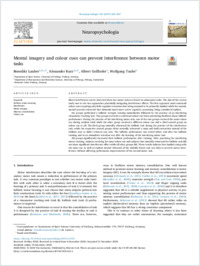Mental imagery and colour cues can prevent interference between motor tasks
- Lauber, Benedikt Department of Sport Science, University of Freiburg, Germany - Department of Neurosciences and Movement Sciences, University of Fribourg, Switzerland
- Kurz, Alexander Department of Sport Science, University of Freiburg, Germany - Bernstein Centre Freiburg, Germany
- Gollhofer, Albert Department of Sport Science, University of Freiburg, Germany
- Taube, Wolfgang Department of Neurosciences and Movement Sciences, University of Fribourg, Switzerland
-
18.02.2019
Published in:
- Neuropsychologia. - 2019, vol. 124, p. 202–207
English
Motor interference can be observed when two motor tasks are learnt in subsequent order. The aim of the current study was to test two approaches potentially mitigating interference effects. The first approach used contextual colour cues requiring only little cognitive attention thus being assumed to be primarily implicit while the second, mental practice/rehearsal that demands much more active cognitive processing being considered explicit.Six groups performed a ballistic strength training immediately followed by the practice of an interfering visuomotor tracking task. Two groups received a contextual colour cue when presenting feedback about ballistic performance. During the practice of the interfering motor task, one of the two groups received the same colour cue during random trials while the other group received a different colour cue and a third control group no colour cue at all. The forth group mentally rehearsed the ballistic task during the practice of the interference task, while the respective control groups either mentally rehearsed a ramp and hold contraction instead of the ballistic task or didn’t rehearse any task. The ballistic performance was tested before and after the ballistic training and in an immediate retention test after the learning of the interfering motor task.All groups significantly increased their ballistic performance after training. After practicing the interfering motor tracking, subjects receiving the same colour cue and subjects that mentally rehearsed the ballistic task did not show significant interference effect while all other groups did. These results indicate that implicit cuing with the same cue as well as explicit mental rehearsal of the initially learnt task can help to prevent motor interference without affecting performance improvements of the second motor task.
- Faculty
- Faculté des sciences et de médecine
- Department
- Département de Médecine
- Language
-
- English
- Classification
- Biological sciences
- License
- License undefined
- Identifiers
-
- RERO DOC 324692
- DOI 10.1016/j.neuropsychologia.2018.12.010
- Persistent URL
- https://folia.unifr.ch/unifr/documents/307756
Statistics
Document views: 98
File downloads:
- tau_mic.pdf: 137
